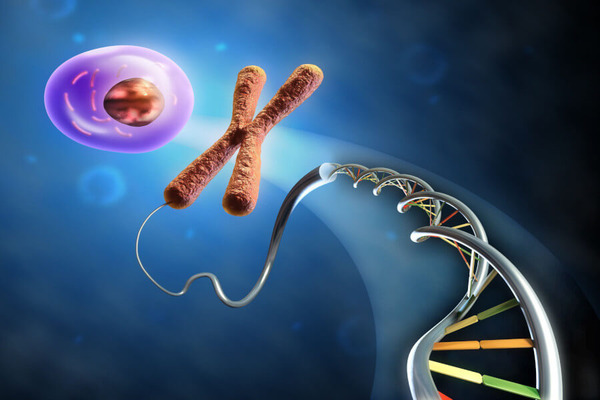No products in the cart.
Genes
Nature And Nurture Of Human Personality
How do genes determine personality types between generations?
We’ve all met someone with extroverted personality types: someone who is outgoing, conversational, and friendly. We also know folks who are quiet, shy and reserved. You have probably met folks who are nice and polite, as well as people who are unfriendly or antagonistic. Some people are trustworthy and conscientious, while others can hardly be relied upon. We all know ethical people as well as those that engage in a variety of nefarious activities.
Where do all these personality types arise? Why are humans so diverse, and how did they come to be this way? Why, for that matter, did you end up the way you did?
Are your personality types influenced more by hereditary or environmental factors? Is it more important for your personality to be shaped by inherited traits or by life experiences? One of the oldest debates in psychology is between nature and nurture. The main point of contention is the relative importance of genetic inheritance and environmental variables in human development.
Over the years, science has swayed back and forth on the answers to the nature-nurture argument. The universally accepted explanation among psychologists, in the beginning, was that most differences between individuals are learned, and thus due to nurture. As experts probed deeper into the essence of personality, they concluded that the hypothesis made in the early days was wrong. What happens to people—how they are raised, what they learn, and their personal experiences—all have an impact on their personalities. Personality is still unquestionably influenced by a person’s genetic makeup according to many publications.
The extent to which personality is the result of nature versus nurture is a hugely vital subject in the study of personality. If nature takes precedence, our personalities will emerge early in life and be difficult to alter afterwards. If nurture is more relevant, our experiences are likely to be more important, and we may be able to change our personalities more flexibly over time. We’ll see in this section that human and animal personality traits are mostly dictated by their genetic makeup, so it’s no surprise that identical twins Paula Bernstein and Elyse Schein (figure 1) turned out to be highly similar despite being raised apart. However, we will find that genetics does not influence everything. See figure 2 below to understand the human genetic makeup.

Figure 1: Identical twins Paula Bernstein and Elyse Schein. The twins were both taken away at birth and brought up by caring families. At the age of 35, they met for the first time and found themselves part of a research project on the subject ‘Nature versus Nurture.’ They share 100% of their DNA. The twins penned a memoir in 2007, Identical Strangers: A Memoir of Twins Separated and Reunited

Figure 2: 23 chromosome pairs form the nucleus of each cell in your body. The first pair is from your dad and the second one is from your mother. The chromosomes consist of DNA biochemical strands (deoxyribonucleic acid), and DNA is divided into genes. A gene is the fundamental biological unit which conveys characteristics from generation to generation. There are some 25,000 genes in human cells.
The genes of many members of the same species are nearly identical. For example, the DNA of your genes is around 99.9% the same as the DNA of your friend’s genes and of all other human beings. These shared genetic structures cause members of the same species to be born with a variety of natural behaviours which describe the species’ traits. These skills and qualities are known as instincts—complex innate behaviour patterns that assure survival and reproduction. Different species have distinctive instincts. Birds make nests, dogs are inherently loyal to their human owners, and people learn to walk, speak, and understand language instinctively.
The strength of certain characteristics and traits also varies amongst species. Rabbits are generally fearful creatures however, some rabbits may be carrying more fear than the average rabbit; dogs are loyal to their caregivers, some more than others, and some people are more able to speak and write better. The tiny quantities (in people, 0.1%) of gene differences among members of the species are responsible for these variances. Personality is determined not by a single gene, but by the actions of several genes that cooperate. No “smart gene” determines intelligence. In addition, genes are not so powerful even when acting together that they can influence or form our personality. Some genes tend to promote a particular feature and others reduce the same feature – the complicated interplay between the genes and a range of random events determines the final result.
Genetic factors always contribute to the formation of personality with environmental influences. A certain sequence of genes does not mean that a particular feature develops, since some characteristics may only exist in certain environments. For example, a person may have a genetic variation known to increase the chance of developing smoking emphysema. But if he never smokes, then he will probably not suffer from emphysema.
In the next part, we will describe the methodologies and the conclusions of behavioural genetic studies on the determinants of personality; and understand how research into molecular genetics allows us to appreciate the function of genetics in personality.
Learn more about how our DNA test can help you. It’s considered the most advanced DNA test in Malaysia that we can provide, so we’d like to offer you our premium DNA test. You can take advantage of this offer and reap the benefits of getting a DNA test.


